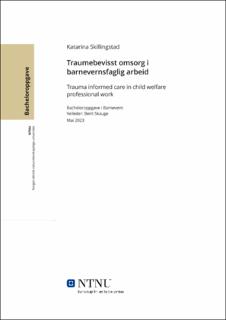| dc.contributor.advisor | Skauge, Berit | |
| dc.contributor.author | Skillingstad, Katarina | |
| dc.date.accessioned | 2023-06-27T17:21:01Z | |
| dc.date.available | 2023-06-27T17:21:01Z | |
| dc.date.issued | 2023 | |
| dc.identifier | no.ntnu:inspera:146306513:66905757 | |
| dc.identifier.uri | https://hdl.handle.net/11250/3073792 | |
| dc.description.abstract | Hensikten med denne bacheloroppgaven er å utforske fagpersoners perspektiver på nøkkelbegreper, styrker og utfordringer ved «traumebevisst omsorg» i barnevernsfaglig arbeid. Oppgaven tar for seg det teoretiske grunnlaget for komplekse traumer hos barn og unge og traumebevisst omsorg. Hovedfokuset vil ligge på traumeforståelse med fokus på utviklingspsykologisk og tilknytningsteoretisk forståelse av traumer. Oppgaven tar også for seg Howard Baths tre grunnpilarer innen traumebevisst omsorg. Metoden som er brukt i oppgaven er en litteraturstudie som består av et utgangspunkt trukket ut fra tre fagartikler hvor ulike fagpersoner drøfter perspektiver på nøkkelbegreper, styrker og svakheter ved traumebevisst omsorg i barnevernsfaglig arbeid. De tre pilarene trygget, relasjon og affektregulering blir drøftet i lys av funnene i de tre artiklene. Videre blir det drøftet hvordan de ulike fagpersonene ser på hvordan TBO kan brukes i praksis. Fagpersoners oppfatninger i lys av en forskningsbasert studie om traumeinformert praksis blir deretter belyst. Det blir fokusert på viktigheten av de tre pilarene og hvordan disse begrepene er helt av avhengig av hverandre både i det miljøterapeutiske arbeidet, i TBO og innen traumeinformert praksis. | |
| dc.description.abstract | The purpose of this bachelor's thesis is to explore professionals' perspectives on the key concepts, strengths and challenges of "trauma-informed care" in child welfare professional work. The assignment deals with the theoretical basis for complex trauma in children and young people and trauma-informed care. The main focus will be on understanding trauma with a focus on developmental psychology and attachment theory understanding of trauma. The assignment also deals with Howard Bath's three pillars of trauma-informed care. The method used in the thesis is a literature study which consists of a starting point extracted from three professional articles where different professionals discuss perspectives on key concepts, strengths and weaknesses of trauma-informed care in child welfare professional work. The three pillars of security, relationship and affect regulation are discussed in light of the findings in the three articles. Furthermore, it will be discussed how the various professionals see how and trauma-informed care can be used in practice. Professionals' perceptions in the light of a research-based study on trauma-informed practice are then highlighted. The focus is on the three pillars and how these terms are completely dependent on each other both in environmental therapeutic work, in trauma-informed care and within trauma-informed practice. | |
| dc.language | nob | |
| dc.publisher | NTNU | |
| dc.title | Traumebevisst omsorg i barnevernsfaglig arbeid | |
| dc.type | Bachelor thesis | |
